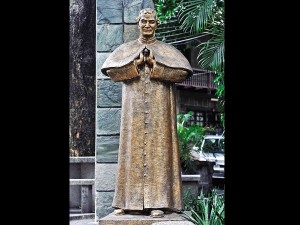While his decades-old artwork in Manila may soon be torn down, his creations in nearby Mandaluyong City are being saved and cherished.
The Don Bosco Technical College is planning to put up a museum of the school’s history, which was made richer by the contributions of Francesco Monti, the Italian sculptor who lived in the country for 28 years and worked with leading Filipino architects in the 1950s.
Monti’s artistic legacy made headlines in the Inquirer last month, albeit on a sad note, when word went out on the demolition of a long-condemned private building in Ermita, Manila, which featured his nine-meter work “The Furies.”
Mayor Joseph Estrada later suspended the demolition of the portion containing the concrete bas-relief piece to allow the Italian embassy to check the work on the mold being prepared so the sculpture could be faithfully reproduced for display at Adamson University.
But at Don Bosco, Monti’s works live on. These include bust and medallion portraits of saints and religious figures, including that of the late Cardinal Rufino Santos, which can be found in various spots on the campus.
DON BOSCO rector Fr. Martin Macasaet with a Monti relief sculpture of Cardinal Rufino Santos. Photo by Andrew Tadalan
School rector Fr. Martin Macasaet said the school administration believed that having a museum would help reconnect its students with the history and cultural heritage of that period when Monti shared his art with Filipinos. Monti died in 1958 and was buried at the San Felipe Neri parish cemetery also in Mandaluyong.
Sense of preservation
“My lament is that sometimes the children’s sense of preservation and history is not that strong. We have to work double time. If we have a place like (a museum) where we can preserve all these, then we can bring the kids there and teach them,” Macasaet told the Inquirer. “The formation of the children has to be more holistic and we need (to expose them) to the humanities.”
A thorough research may be in order for the planned museum to also tell the back stories behind every Monti piece on campus. Macasaet surmised that the works were commissioned by the school’s pioneers, Italian priests who may have been friends of the artist when he lived in a studio in nearby San Juan.
The images include that of Don Bosco or St. John Bosco, the 19th century Italian priest who devoted his work to educating disadvantaged youths or street children; St. Dominic de Savio, one of Don Bosco’s students; Jose Maria Delgado, a shipping magnate who figured in the scouting movement in the Philippines, and Cardinal Santos, the first Filipino cardinal, who had his “priestly formation” at Don Bosco when it was still known as San Carlos Seminary
According to Macasaet, the Monti pieces were merely kept in a storage room for years until he ordered them to be put back on display when he became head of the school in 2008.
They remain in relatively good condition, although the St. Dominic de Savio piece has already lost its crucifix, he noted.
Apart from the sculptures, the museum will also feature the the memorabilia of the school’s first Salesian priests, such as old coins and paintings. It may be housed in a nearly “300-year-old” building on the campus.
“This is a work in progress. After setting up a library in that building, we plan to have the museum next,” Macasaet said.
The Don Bosco alumni community may have to be tapped for support and the target is to have the project started by 2016, when the building hits its tercentennial year, he said.
